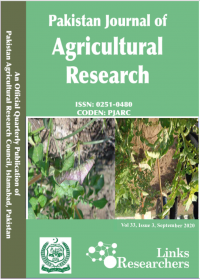Calcium Carbide Induced Ethylene Regulates Seed Dormancy and Post-Germination Growth of Sweet Pepper
Calcium Carbide Induced Ethylene Regulates Seed Dormancy and Post-Germination Growth of Sweet Pepper
Wazir Ahmed1*, Muhammad Naeem Akhtar2, Muhammad Waseem Akhtar3, Muhammad Nauman Hanif1, Aiman Salah ud Din4 and Ahmad Mahmood1
ABSTRACT
Seed dormancy impacts seed germination success and seedling health. Ethylene plays a crucial role in facilitating the breaking of seed dormancy by initiating essential biochemical and physiological changes that are necessary for successful seed growth and development. It was hypothesized that acetylene (C2H2) from calcium carbide (CaC2) has the potential to induce an ethylene response in seed for breaking seed dormancy and better seedling growth. A study was conducted to evaluate the impacts of C2H2 released from ten CaC2 concentrations, i.e., 2, 4, 6, 8, 10, 12, 14, 16, 18, and 20 mg petri-plate-1, on seed dormancy and seedling growth in sweet pepper. Results indicated that CaC2 significantly induced 100% early seed germination, with significant improvements in post-germination variables. CaC2 applied at 14 mg petri-plate-1 was found to be an optimum dose for regulating seed dormancy and post-germination growth positively. However, CaC2 >16 mg petri-plate-1 proved lethal and suppressed the germination or growth of the seedlings. Compared to control treatment, improvements in seed sermination and growth variables, i.e., 8 to 37% in seed germination, 5 to 22% in seedling biomass, 5 to 46% in shoot length, and 3 to 37% in root length, suggest that calcium carbide, easily available on the market, can be used for seed dormancy breakage and better crop stand.
To share on other social networks, click on any share button. What are these?






